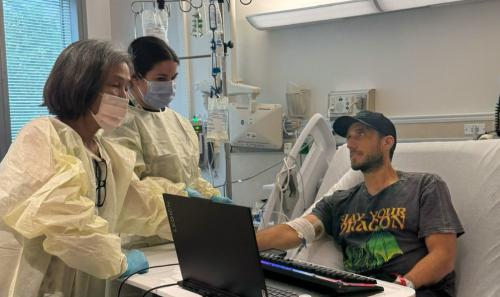
-
Understanding primary immunodeficiency (PI)

Understanding PI
The more you understand about primary immunodeficiency (PI), the better you can live with the disease or support others in your life with PI. Learn more about PI, including the various diagnoses and treatment options.
-
Living with PI
-
Addressing mental health
-
Explaining your diagnosis
- General care
- Get support
- For parents and guardians
-
Managing workplace issues
- Navigating insurance
-
Traveling safely

Living with PI
Living with primary immunodeficiency (PI) can be challenging, but you’re not alone—many people with PI lead full and active lives. With the right support and resources, you can, too.
-
Addressing mental health
-
Get involved

Get involved
Be a hero for those with PI. Change lives by promoting primary immunodeficiency (PI) awareness and taking action in your community through advocacy, donating, volunteering, or fundraising.
-
Advancing research and clinical care
-
Research Grant Program
-
Consulting immunologist
-
Diagnosing PI
-
Getting prior authorization
-
Clinician education
-
Survey research
-
Participating in clinical trials

Advancing research and clinical care
Whether you’re a clinician, researcher, or an individual with primary immunodeficiency (PI), IDF has resources to help you advance the field. Get details on surveys, grants, and clinical trials.
-
Research Grant Program
Orchard Therapeutics recently announced that it would stop using Strimvelis, a gammaretroviral vector-based gene therapy, to treat persons with ADA-SCID (adenosine deaminase deficiency severe combined immunodeficiency). The company made the decision because a patient treated in 2016 with Strimvelis has developed leukemia, which could be attributable to the gene therapy. Strimvelis is approved for use by the European Medicines Agency (EMA), but not the Food and Drug Administration (FDA), and is not used in the U.S.
The announcement came as concerning news to the SCID community. While HSCT (hematopoietic stem cell transplant) is the accepted treatment for SCID, clinical trial gene therapy is also available for persons with X-linked SCID and Artemis SCID, and, until recently, ADA-SCID, in the U.S.
The SCID Compass program conducted an interview with Dr. Jack Routes, Section Chief of Allergy and Clinical Immunology at Children’s Wisconsin and Professor of Pediatrics, Medicine, Microbiology, and Immunology in the Department of Pediatrics at Children’s Wisconsin - Medical College of Wisconsin, and clinical lead for the SCID Compass program, and Dr. Mort Cowan, Pediatric Immunologist, Professor of Pediatrics and Chief, Allergy Immunology and BMT Division at University of California San Francisco, to address questions families may have about gene therapy in the U.S.
Can you provide a broad overview of how gene therapy for SCID works?
SCID is caused by a mutation or error in a gene that is necessary for making T cells and, in some cases, B cells and NK (natural killer) cells, which are essential for a normal immune system. There are nearly 20 genes in which mutations have been identified that result in SCID.
A gene is composed of DNA, which is the blueprint used by cells to make proteins. A gene mutation causes the protein to be absent or damaged.
Gene therapy corrects the abnormal gene by introducing a normal copy of the gene or fixing the abnormal gene in the bone marrow stem cells. Bone marrow stem cells are the “factories” that make all the cells in the blood, including the white cells in the immune system.
Once the bone marrow stem cells from the patient have the healthy gene inserted into their DNA, they are infused into the baby with SCID, and the stem cells then are able to form a normal immune system. Because the patient’s bone marrow stem cells can grow and live a normal lifespan, gene therapy is expected to be effective for the life of the patient.
What types of vectors are used in gene therapy clinical trials in the U.S. to treat SCID?
A vector is a method to introduce the healthy gene into the DNA of stem cells. Vectors are derived from viruses that have the ability to introduce genes into cellular DNA. The viruses have been modified by removing all of the viral genes that are necessary to cause an infection and replacing them with the normal SCID gene of interest.
Lentiviral vectors are used today to treat SCID since they are very efficient at inserting the SCID gene of interest into the patient’s stem cells. They are unlikely to cause serious problems such as leukemia.
What kind of vectors are used for X-linked SCID? ADA-SCID? Artemis SCID?
The first gene therapy trials for ADA (Adenosine Deaminase Deficiency) -SCID and X-linked SCID used gamma-retroviruses to carry genes into the stem cells. However, it was found that when gamma-retroviruses inserted into the chromosomes, they sometimes turned on cancer-causing genes near the site of insertion, leading to leukemia, a cancer of white blood cells.
To solve this problem, researchers genetically altered gamma-retroviral vectors and also developed lentiviral vectors that are much less likely to turn on cancer-causing genes when they integrate. Currently, all studies in the United States to treat ADA-SCID, X-linked SCID, and ART (Artemis-deficient) -SCID use lentiviral vectors.
Should those who have undergone, are currently undergoing, or considering undergoing gene therapy be concerned about the Orchard announcement? Why or why not?
In 2016, Orchard Therapeutics obtained approval by the European Medicines Agency (EMA), the European equivalent of the U.S. Food and Drug Administration, for the use of a gamma-retrovirus containing a normal ADA gene called Strimvelis to treat ADA-SCID.
Unfortunately, the gamma-retrovirus that was used could still activate cancer-causing genes, and one patient developed leukemia. Consequently, the use of Strimvelis to treat ADA-SCID has been stopped.
There are approximately 40 patients with ADA-SCID in the U.S. who have received gene therapy using a gamma-retroviral vector similar to Strimvelis. None of these patients have developed leukemia, but they are being closely followed.
Since 2010, all patients (approximately 60) in the U.S. and the U.K have received therapy using a lentiviral vector with no evidence of leukemia in any of them.
Orchard Therapeutics owns the license for lentiviral gene therapy for ADA-SCID, but they have put the development of the therapy on hold for the next 1 to 2 years.
Can you please explain why the gamma-retroviral delivery system is more likely to cause leukemia?
There are several reasons. One is that gamma-retroviral vectors have a propensity to insert their DNA into or around what are called oncogenes, which are human genes that, when activated, can result in cancer.
In addition, in the original versions of these vectors, there was an intact portion of the vector called the LTR that is a very potent activator of genes, including oncogenes. It appears that by inactivating this part of the LTR, these gamma-retroviral vectors are less likely to cause leukemia. However, because they are less efficient than lentiviral vectors, they are no longer used for gene therapy.
Do you have an estimate of how many persons with SCID have been treated with gene therapy in the U.S.?
For ADA-SCID, X-linked SCID, and ART-SCID, there have been approximately 125 patients treated, including newly diagnosed patients and patients who have failed a prior standard bone marrow transplant.
Click here to read the Orchard Therapeutics statement on Strimvelis.
Related resources
Sign up for updates from IDF
Receive news and helpful resources to your cell phone or inbox. You can change or cancel your subscription at any time.





The Immune Deficiency Foundation improves the diagnosis, treatment, and quality of life for every person affected by primary immunodeficiency.
We foster a community that is connected, engaged, and empowered through advocacy, education, and research.
Combined Charity Campaign | CFC# 66309




